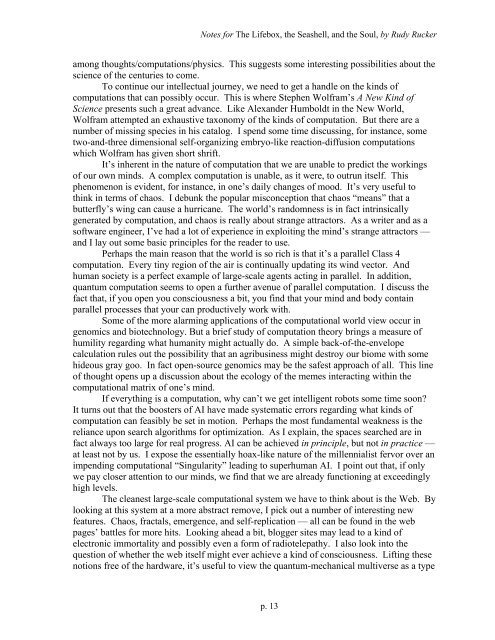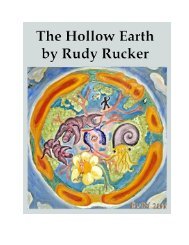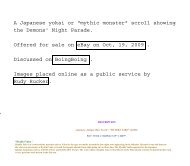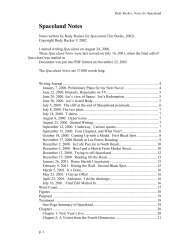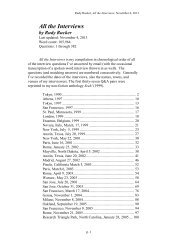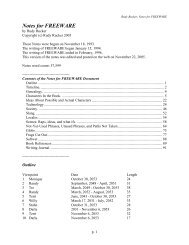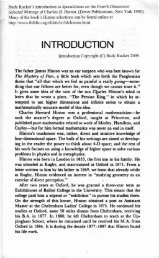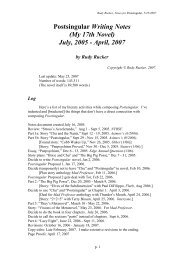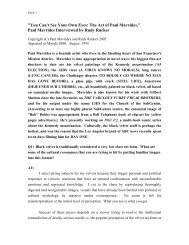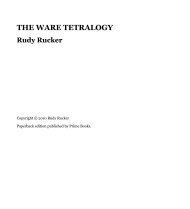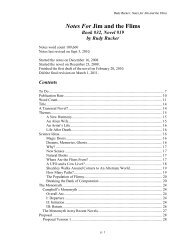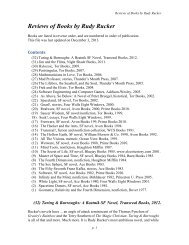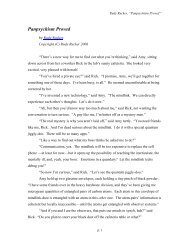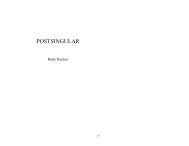Notes for the Lifebox, the Seashell, and the Soul - Rudy Rucker
Notes for the Lifebox, the Seashell, and the Soul - Rudy Rucker
Notes for the Lifebox, the Seashell, and the Soul - Rudy Rucker
You also want an ePaper? Increase the reach of your titles
YUMPU automatically turns print PDFs into web optimized ePapers that Google loves.
<strong>Notes</strong> <strong>for</strong> The <strong>Lifebox</strong>, <strong>the</strong> <strong>Seashell</strong>, <strong>and</strong> <strong>the</strong> <strong>Soul</strong>, by <strong>Rudy</strong> <strong>Rucker</strong><br />
among thoughts/computations/physics. This suggests some interesting possibilities about <strong>the</strong><br />
science of <strong>the</strong> centuries to come.<br />
To continue our intellectual journey, we need to get a h<strong>and</strong>le on <strong>the</strong> kinds of<br />
computations that can possibly occur. This is where Stephen Wolfram’s A New Kind of<br />
Science presents such a great advance. Like Alex<strong>and</strong>er Humboldt in <strong>the</strong> New World,<br />
Wolfram attempted an exhaustive taxonomy of <strong>the</strong> kinds of computation. But <strong>the</strong>re are a<br />
number of missing species in his catalog. I spend some time discussing, <strong>for</strong> instance, some<br />
two-<strong>and</strong>-three dimensional self-organizing embryo-like reaction-diffusion computations<br />
which Wolfram has given short shrift.<br />
It’s inherent in <strong>the</strong> nature of computation that we are unable to predict <strong>the</strong> workings<br />
of our own minds. A complex computation is unable, as it were, to outrun itself. This<br />
phenomenon is evident, <strong>for</strong> instance, in one’s daily changes of mood. It’s very useful to<br />
think in terms of chaos. I debunk <strong>the</strong> popular misconception that chaos “means” that a<br />
butterfly’s wing can cause a hurricane. The world’s r<strong>and</strong>omness is in fact intrinsically<br />
generated by computation, <strong>and</strong> chaos is really about strange attractors. As a writer <strong>and</strong> as a<br />
software engineer, I’ve had a lot of experience in exploiting <strong>the</strong> mind’s strange attractors —<br />
<strong>and</strong> I lay out some basic principles <strong>for</strong> <strong>the</strong> reader to use.<br />
Perhaps <strong>the</strong> main reason that <strong>the</strong> world is so rich is that it’s a parallel Class 4<br />
computation. Every tiny region of <strong>the</strong> air is continually updating its wind vector. And<br />
human society is a perfect example of large-scale agents acting in parallel. In addition,<br />
quantum computation seems to open a fur<strong>the</strong>r avenue of parallel computation. I discuss <strong>the</strong><br />
fact that, if you open you consciousness a bit, you find that your mind <strong>and</strong> body contain<br />
parallel processes that your can productively work with.<br />
Some of <strong>the</strong> more alarming applications of <strong>the</strong> computational world view occur in<br />
genomics <strong>and</strong> biotechnology. But a brief study of computation <strong>the</strong>ory brings a measure of<br />
humility regarding what humanity might actually do. A simple back-of-<strong>the</strong>-envelope<br />
calculation rules out <strong>the</strong> possibility that an agribusiness might destroy our biome with some<br />
hideous gray goo. In fact open-source genomics may be <strong>the</strong> safest approach of all. This line<br />
of thought opens up a discussion about <strong>the</strong> ecology of <strong>the</strong> memes interacting within <strong>the</strong><br />
computational matrix of one’s mind.<br />
If everything is a computation, why can’t we get intelligent robots some time soon?<br />
It turns out that <strong>the</strong> boosters of AI have made systematic errors regarding what kinds of<br />
computation can feasibly be set in motion. Perhaps <strong>the</strong> most fundamental weakness is <strong>the</strong><br />
reliance upon search algorithms <strong>for</strong> optimization. As I explain, <strong>the</strong> spaces searched are in<br />
fact always too large <strong>for</strong> real progress. AI can be achieved in principle, but not in practice —<br />
at least not by us. I expose <strong>the</strong> essentially hoax-like nature of <strong>the</strong> millennialist fervor over an<br />
impending computational “Singularity” leading to superhuman AI. I point out that, if only<br />
we pay closer attention to our minds, we find that we are already functioning at exceedingly<br />
high levels.<br />
The cleanest large-scale computational system we have to think about is <strong>the</strong> Web. By<br />
looking at this system at a more abstract remove, I pick out a number of interesting new<br />
features. Chaos, fractals, emergence, <strong>and</strong> self-replication — all can be found in <strong>the</strong> web<br />
pages’ battles <strong>for</strong> more hits. Looking ahead a bit, blogger sites may lead to a kind of<br />
electronic immortality <strong>and</strong> possibly even a <strong>for</strong>m of radiotelepathy. I also look into <strong>the</strong><br />
question of whe<strong>the</strong>r <strong>the</strong> web itself might ever achieve a kind of consciousness. Lifting <strong>the</strong>se<br />
notions free of <strong>the</strong> hardware, it’s useful to view <strong>the</strong> quantum-mechanical multiverse as a type<br />
p. 13


